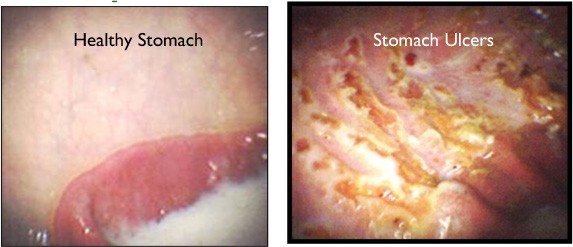
Behaviour and stress responses in horses with gastric ulcers
Gastric ulceration has been frequently described in performance horses, yet, little is known about behaviour and stress responses in horses with gastric ulceration. This study aimed to report the prevalence of gastric ulceration in horses housed in standardised conditions and whether horses diagnosed with Equine Gastric Ulceration Syndrome (EGUS) have increased baseline and response concentrations of stress hormones and behave differently than control horses
For the study the stomachs of 96 horses were investigated and divided into two groups; an ulcer group (horses with severe lesions in the glandular mucosa) and a control group (free from gastric ulcers). Subsequently, horses were tested in a novel object test (NOT) and exposed to postponed feeding. Heart rate, faecal cortisol metabolites (FCM) concentrations and behaviour were measured during the NOT and behaviour during postponed feeding.
Results showed that 40.6% of the horses had lesions in the non-glandular squamous and 55.2% of the horses in the glandular portion of the stomach. Video analysis showed that ulcer horses pawed more and were more eager to eat during postponed feeding. During the NOT heart rate did not differ between the two groups, however, FCM was 26% higher in ulcer horses indicating that they are more stress sensitive to novelty. Furthermore, the amount of starch in the feed and paternity influenced the risk of having gastric ulceration.
The authors concluded that the prevalence of gastric ulceration in riding horses was high and therefore, certain management factors should be carefully considered to prevent the development of gastric ulceration.
Expert opinion by Debby Gudden
Gastric ulcers have been known to plague horses that are confined a majority of the time, travel often, compete in new surroundings, and face abrupt changes in diet. Simply put, gastric ulcers may result whenever a horse is placed in an unfamiliar or stressful situation for any length of time. Additionally, the results of this study showed that ulcer horses are more stress sensitive compared to non-gastric ulcers. Therefore, it is important to prevent stressful situations to lessen the development of glandular ulceration, or to protect horses with this condition. Furthermore, it is important to simulate the natural environment by providing as much fibre as possible, avoiding prolonged periods without forage and using low-starch feeds whenever possible.
> From: Malmkfist et al., Appl Anim Behav Sci. 142 (2012) 160-167. All rights reserved to Elsevier B.V.. Click here for the online summary.


